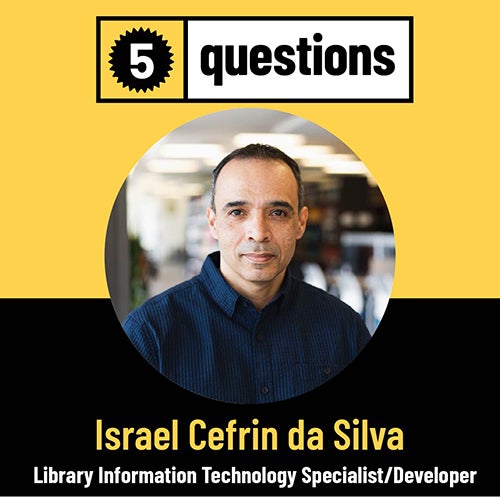
Once a month the Student Engagement and Communications Assistant co-op student interviews Library staff to provide patrons with a peek behind the bookstacks at all the work that happens to provide a variety of services and resources that support the learning, research and innovation that happens at Waterloo.
This month, co-op student Mia Malidzanovic interviewed Israel Cefrin da Silva, Library Information Technology Specialist/Developer.
Q1: How does your position benefit the Library community?
At the end of the day, I'm a web developer here, at the Library, which requires me to be a permanent learner. The main goal of my team is to make information and resources available online to the community. We put all the resources that we have digital access to on the Library’s website. For example, journals, platforms, and websites that staff, faculty, and students need to use in their research or assignments; we provide online access, and we find and resolve any issues that may make those resources harder to access. At the end of the day, if everyone has smooth access to the content they need, this is our greatest impact. We do our best to make things work!
Q2: What is one Library service or resource that Library users should know about?
One service on the Library’s website that I think is cool, handy, and simple to use is the assignment planner. The assignment planner breaks down any writing project into manageable and measurable steps. For example, if you need to finalize a research paper by March 3rd, you can set that as your end date and then select your start date for when you plan to begin the assignment. What the assignment planner then does for you is it provides a breakdown of the 5-6 steps you need to take, each with their own timeline and due date. By following these personalized steps, your assignment is broken down into manageable pieces. However, it isn’t limited to writing assignments; there are math assignments, research reports, survey reports, etc. Other universities are recognizing the value of this and promoting our handy tool.
Q3: What other faculties or departments do you work with on campus?
I have been working closely with the Office of Research recently; we have developed a grant submissions system where researchers can send their proposals for grants that are assessed by online peer reviewers. This system is completely anonymous, which eliminates bias. Additionally, I spend a lot of time with Information Systems & Technology (IST) as we run more than 16 websites that are connected. We need to work with IST to manage these websites and any other tool that we have running on our websites.
Q4: Where do you see the future of the Library?
I’m not a librarian but most of my time in the workforce has been working alongside librarians and in libraries. This is the background that informs my perception of the future. When most people think of a library their minds go to archives, books, journals, records of songs but I see a space of knowledge and ultimately technology.
As technology advances, I see the library serving as a mediator between users and information. With new technology, such as AI (Artificial Intelligence), there are wider and more diverse scenarios in which the library can come alongside and partner with people. The library is full of knowledge the same way the ocean is full of water. In both instances you need guidance to navigate what is ahead of you safely. Helping people learn how to navigate information wisely and sustainably is exactly where I see the library stepping in. The library is not only a vault for and of knowledge, but it is a space of shared experiences.
Q5: What is your favorite book?
This is a very hard question! I don’t think I can say I have just one favourite book. There are quite a few books that I really enjoy and love that have impacted me in some way. I have at least three books that I really like and would recommend to anyone. The first is written in Portuguese but there is a translated English version called Barren Lives by Graciliano Ramos. The book takes place in Brazil and is about a poor family that is struggling to survive in a hostile environment. Weather and climate are also big focuses throughout the book. As the story unfolds it is almost impossible not to get attached to the characters and their dog. The second book is Tipping Point by Malcolm Gladwell. He talks about small actions and how they can create big changes. Finally, iWoz, Steve Wozniak’s biography. Steve is a critic of Apple, but he is also a stereotype for curious people. As a curious person myself, I loved learning about how things work and hearing about his journey during his time at Apple. One thing that really stuck out to me is that he created some of the Apple products because he wanted to use them, not to sell them.
If you enjoyed reading about Israel’s role at the Library, read our previous interviews with librarian Marian Davies, librarian Farzaneh Keramati, librarian Jackie Stapleton, university librarian Beth Namachchivaya, director of information technology and facilities services Randy Dauphin, and library coordinator at Musagetes Mark Anderton.